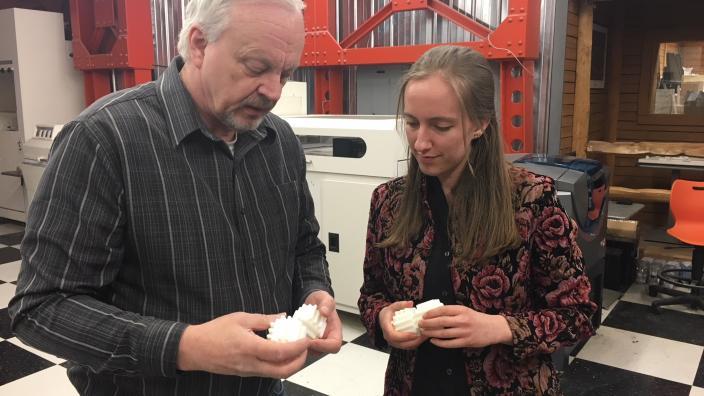The child has hemiplegic cerebral palsy which causes tightness in one side of his body and means he needs encouragement to use the tight side. The UMD student, Micki Grover, took an independent study course with UMD Professor Abigail Clarke-Sather that focused on toy design.
“I designed a transformable car toy and guided seven teams from UMD’s Solid Modeling class as they designed toys for extra credit,” said Grover. “Now we’re in the testing portion of the project, giving the prototypes to the child with limited mobility and other children at UMD’s Children’s Place day care center.”
Two of the toy designs were made in NRRI’s Rapid Prototype Center with Fused Deposition Modeling using ABS materials.
“This is a great example of what 3D printing can do,” said Lab Manager Steve Kossett. “A unique, customized toy can be developed very quickly for a child to meet his or her limitations, rather than try to alter a prefabricated toy. We can also easily change the design to make it better.”
Grover and Professor Clarke-Sather are exploring the theory that children with developmental needs can be considered “lead users” in the consumer world. They are people whose needs precede those of the rest of the market. For instance, a child without use of her lower body could benefit from a toy with parts that do not fall out of reach, like a ball that rolls away. But that new toy could also be good for any child strapped into a car seat.
A corkscrew styled toy that was designed by one of the modeling class students to encourage manual dexterity has been a big hit with all the day care children. Grover measured their interactions based on a scoring system from the Individual Growth and Development Indicators early childhood assessment.
“We’re hoping that the child we designed the toys for will have an equally positive reaction,” she said. “I hope that our work will benefit a group of children that don’t always have access to toys that meet their unique developmental needs and also benefit all children along the way.”
Visit the NRRI website.
